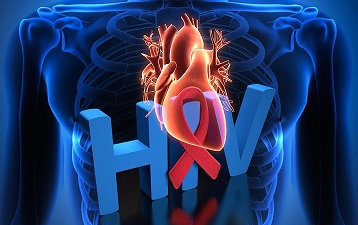HIV News: Kings College London Study Validates That HIV Infections Increase Risk Of Cardiovascular Issues!
HIV News - Heart Issues And HIV Nov 29, 2022 3 years, 1 month, 4 weeks, 1 day, 11 hours, 14 minutes ago
HIV News: A new study review led by researchers from Kings College London British Heart Foundation Centre, School of Cardiovascular and Metabolic Medicine & Sciences -UK has found that HIV infections increase risk of cardiovascular issues!

The study team warned that HIV-associated cardiovascular disease is increasing in prevalence, but its mechanisms remain poorly understood.
The study team aimed to systematically review data from advanced cardiovascular imaging studies evaluating computed tomographic coronary angiography, positron emission tomography (PET), and cardiac magnetic resonance (MR), in individuals living with HIV compared with uninfected individuals.
Three databases and Google Scholar were searched for studies assessing cardiovascular pathology using computed tomographic coronary angiography, cardiac MR, PET, and HIV from inception to February 11, 2022.
The part of the study team selected original studies without any restrictions on design, date, or language, investigating HIV and cardiovascular pathology.
One investigator extracted data checked by a second investigator. Prevalence ratios (PRs) and differences in inflammation among individuals living with HIV and uninfected individuals were qualitatively synthesized in terms of cardiovascular pathology. Study quality was assessed using the National Heart, Lung, and Blood Institute quality assessment tool for observational studies.
Primary outcomes were computed tomographic coronary angiography–defined moderate to severe (≥50%) coronary stenosis, cardiac MR–defined myocardial fibrosis identified by late gadolinium enhancement, and PET-defined vascular and myocardial target to background ratio. Prevalence of moderate to severe coronary disease, as well as myocardial fibrosis, and PRs compared with uninfected individuals were reported alongside difference in vascular target to background ratio.
A total of forty-five studies including 5218 people living with HIV (mean age, 48.5 years) and 2414 uninfected individuals (mean age, 49.1 years) were identified.
Of these, sixteen studies (n = 5107 participants) evaluated computed tomographic coronary angiography; 16 (n = 1698), cardiac MRs; 10 (n = 681), vascular PET scans; and 3 (n = 146), both computed tomographic coronary angiography and vascular PET scans.
It was noted that no studies originated from low-income countries. Regarding risk of bias, 22% were classified as low; 47% moderate; and 31% high.
The study findings showed that prevalence of moderate to severe coronary disease among those with vs without HIV ranged from 0% to 52% and 0% to 27%, respectively, with PRs ranging from 0.33 (95% CI, 0.01-15.90) to 5.19 (95% CI, 1.26-21.42).
Importantly, prevalence of myocardial fibrosis among those with vs without HIV ranged from 5% to 84% and 0% to 68%, respectively, with PRs ranging from 1.01 (95% CI, 0.85-1.21) to 17.35 (95% CI, 1.10-274.28). Differences in vascular target to background ratio among those with vs without HIV ranged from 0.06 (95% CI, 0.01-0.11) to 0.37 (95% CI, 0.02-0.72).
First author, Dr Jonathan Hudson, from Kings College London’s School of Cardiovascular and Metabolic M
edicine & Sciences told
HIV News reporters at Thailand Medical News, "As HIV becomes a chronic disease and individuals live longer, they are at greater risk of developing heart disease. It is vital we try and understand how HIV and AIDS causes heart disease, a problem which our study indicates remains unanswered. In addition, our research points to an urgent need for studies to be conducted in low-income countries, and in particular in sub-Saharan Africa where the burden of HIV is greatest.”
The study findings of this systematic review of studies of advanced cardiovascular imaging, the estimates of the associations between HIV and cardiovascular pathologies demonstrated large amounts of heterogeneity.
The study findings provide a summary of the available data but may not be representative of all individuals living with HIV, including those from low-income countries with higher HIV endemicity.
The study findings were published in the peer reviewed journal: JAMA Network.
https://jamanetwork.com/journals/jama/article-abstract/2796250
This is among the first literature review that has examined the relationship between having HIV infection and disease of the heart muscle or arteries.
The detailed review of 45 studies by researchers from Kings College London’s School of Cardiovascular and Metabolic Medicine & Sciences and the London School of Hygiene and Tropical Medicine showed that individuals with HIV are much more likely to die of other causes besides AIDS, and the leading cause of death is due to heart disease.
It is however not well understood why individuals with HIV are at greater risk of heart disease and whether HIV directly affects the heart muscle or the arteries that supply that muscle.
The study team collected all the studies that used advanced imaging techniques to better understand the potential ways on how HIV infection affects the heart.
Most of these studies originated from developed countries, despite the global burden of HIV mainly prevalent in sub-Saharan Africa. Additionally, most the individuals studied were older men, even though much of the global HIV population is younger women.
The detailed analysis found just over a third of the studies showed a relationship between having HIV infection and disease in the heart arteries.
Interestingly however, these studies showed a lot of variation in the strength of the relationship. Nearly half of the studies showed a relationship between having HIV infection and disease in the muscle of the heart, but there was also a variation in the strength of this relationship.
The study team also comprised of researchers from the following entities:
-Department of Cardiology, Epsom and St Helier University Hospitals Trust, London, United Kingdom
-Biomedical Research and Training Institute, Harare, Zimbabwe
-Department of Medical Physics and Imaging Sciences, Faculty of Medicine and Health Sciences, University of Zimbabwe
-Department of Clinical Research, London School of Hygiene & Tropical Medicine, London, United Kingdom
-Department of Non-communicable Disease, London School of Hygiene & Tropical Medicine, London, United Kingdom
-Department of Cardiology, North Bristol NHS Trust, Bristol, London, United Kingdom
-Department of Cardiology, Imperial College NHS Trust, London, United Kingdom
For the latest
HIV News, keep on logging to Thailand Medical News.
